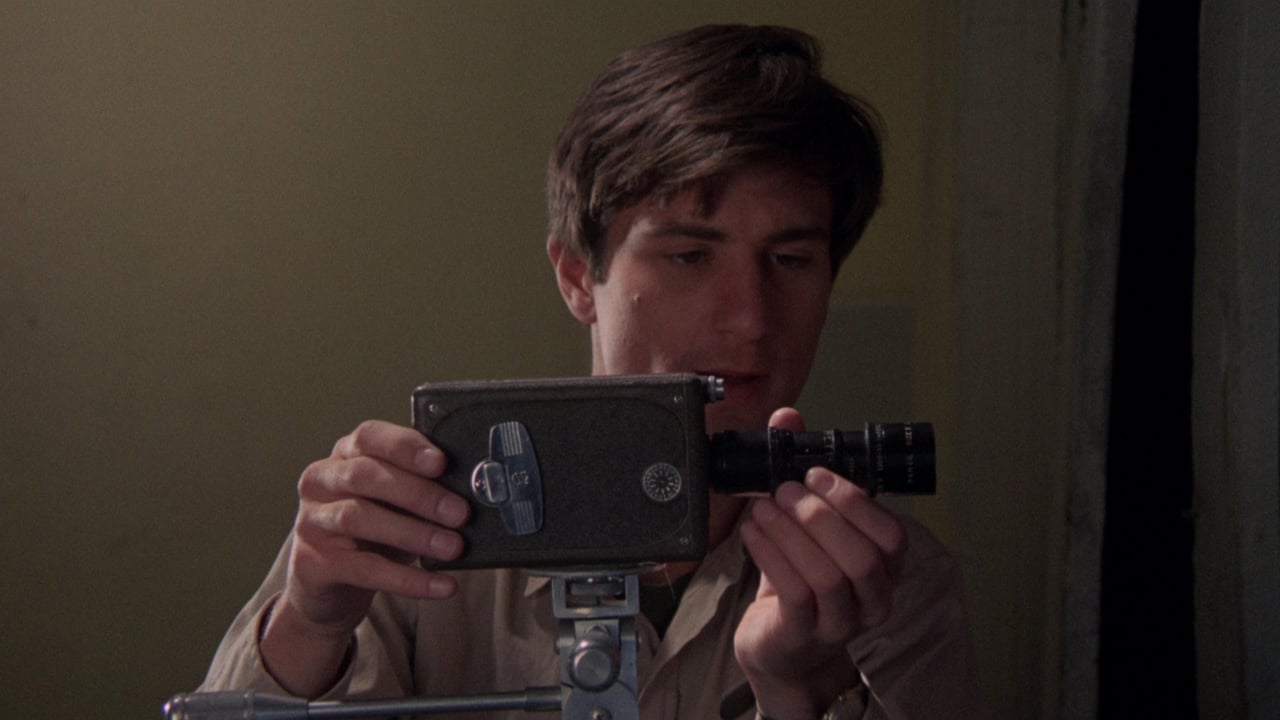Matcollis
This Movie Can Only Be Described With One Word.
Spoonatects
Am i the only one who thinks........Average?
ChicRawIdol
A brilliant film that helped define a genre
Zlatica
One of the worst ways to make a cult movie is to set out to make a cult movie.
Dave from Ottawa
Long before either Robert DeNiro or Brian DePalma were famous, they teamed for this low budget satire on Urban Life in late 60s NYC. The resulting film was a mixed bag at best, with one truly brilliant sequence - the guerrilla theater piece "Be Black, Baby" - a few clever observations and a fair bit of dead time, where it seems as if nobody came up with much, and it got filmed anyway. DeNiro plays a Vietnam vet who wanders about NYC filming things 'peeping Tom' style, looking for a purpose in life or a personal mission. If this sounds like Travis Bickle (Taxi Driver) with a camera rather than a cab, it sure does, but unfortunately, DeNiro has less to do that is cinematically captivating here than in his "Are you talking' to me?" moments as Bickle. The character is less interesting on screen, less well-formed and thus less of a scene-stealer. Plus, DePalma was clearly so enamored of the film- making process that the viewer is supposed to find the voyeuristic act of simply filming stuff to be as orgasmic as the director thinks it is, even when nothing much very interesting is being filmed. I still recommend the movie but urge caution. The good parts here are really good. It would be a better movie, obviously, if there were more of them.
Robert Bloom
The second bizarre hippy satire from a young Brian DePalma (the first being Greetings), and featuring a remarkably spontaneous Robert DeNiro as a young Viet Nam vet new in the city and looking for work. The film (while noticeably dated), is practically an act of radicalism in itself as DeNiro boyishly tries to seduce his neighbors while simultaneously filming the act from his apartment to turn it into a work of explosive pornography. DePalma is clever here; he manages to transform the neighboring windows into fixed frames reminiscent of Hitchcock's Rear Window. Once a failure, DeNiro performs as a reactionary police officer in an all African American theater troupe's educational TV program, in which blacks offer liberal whites the opportunity to experience African Americanism as they beat and rape them in white-face; this sequence is particularly strange and not all together funny until DeNiro arrives as the cop. And finally, he transforms himself once again into a guerrilla revolutionary, bombing Laundromats and disguising himself as a bourgeois salesman. This final section is probably the most enjoyable and improvised, though it contains none of the creativity of the first section. The film is interesting if for nothing else, because one gets to witness DePalma and DeNiro stylistically severed from their current work. However, the film seems to try to satirize everything in our society, when in fact it comes across as though it has satirized nothing.
Msfixall
Seems everyone in this film is channeling Woody Allen. They stammer and pause and stammer some more. Only for REALLY die-hard DeNero fans! It tries to appear as edgy and artistic - but it comes off as looking like a very, very low budget film made by college students. The most often used word in the whole film is "hum". The film does peg the atmosphere of the late sixties/early seventies though. If you like films where people are CONSTANTLY talking over each other, horrible lighting (even if it is for "art's sake"), and makes you feel like you are sitting in on a lame political meeting, then you might like this - but you need to be really bored. I found this CD in the dollar bin and now I know why.
weho90069
Just rented and watched HI, MOM! and am blown away by parts of it which are so ahead of its time as to seem contemporary, given today's post-MTV-era approach to film-making. I would say 80% of this film is utterly brilliant and 20% is merely so-so; scenes with extended dialog sometimes have you checking your watch since the characters may seem to drone on about this-or-that, but there are enough funny moments in these sorts of scenes to keep your attention. And, believe me, you want to stay tuned for the "Be Black, Baby" portion of the film which is nothing short of side-splitting. The way the film is made, with its occasional fast-paced editing, sped-up footage, and other visual tricks (so dePalma) will appeal greatly to the short-attention-spans of today and seem to anticipate the way films will be made by mainstream producers and directors who cut their teeth creating music videos for MTV. I'm not saying this film feels like a music video, but it uses various visual devices which would become standard fare in music videos and part of today's cinematic vocabulary. Again, I can't reinforce how ahead of its time this film is, apparently foreshadowing things like "reality TV" in the "Be Black, Baby" guerrilla theatre piece.It's astounding and frightening to see how far we possibly HAVEN'T come past these notions of entertainment, or how they've become scarily mainstreamed by Hollywood. DeNiro gives a terrific performance and it's a real treat to see him doing something like this at a young age. Kudos to DePalma for this film, also -- it's a filmmaker's dream with all the film-within-film devices and you can see he's working out his fascination with optical and split-screen-type manipulations in a very youthful, bravura sort of way. I would say this is DePalma at his most innovative, aside from his shamefully underrated film SISTERS...before he became bloated and weighed down by the mainstream Hollywood ethic. That's not to say DRESSED TO KILL or CARRIE are bad pictures or bad reflections on DePalma, but they don't reflect the liberated genius that is clearly evident in HI, MOM! or SISTERS.HI, MOM! is an absolute MUST-SEE for any DePalma fan, general cineaste, film student, or comedy devotee. There are still lessons to be learned from watching this film, even today when it seems all the tricks DePalma used have been exploited ad infinitum. HI, MOM! manages to feel fresh in an era when -- by rights -- it really ought to feel stale. It's also a tremendously valuable look at pop culture from 1970 and contains some great moments in an adult movie theater. My favorite line occurs there, when a porno producer is counseling DeNiro (a would-be amateur porno producer himself, using his Super 8 mm camera). The two men sit in the back row, discussing the film they're watching and how it's made (and, for the uninitiated, this is typically where men-who-seek-the-company-of-other-men will congregate). Suddenly we have a rapid cut which shows another theater patron has sat himself next to the men, and the patron puts his hand on the leg of one of the men (DeNiro, I think, who brushes it off with some shock and embarrassment). The porno producer (mentor) says very sympathetically, regarding the gesture of the patron, "...he means well." Boy, ain't that the truth! Meanwhile, in the background, another patron is being thrown out of the men's room (presumably for having made a pass at someone homophobic).Another scene involves a pharmacist opening a condom package and demonstrating its strength and elasticity. Hilarious.These are issues you would likely never see addressed today in a mainstream Hollywood film because of America's prudishness, or they would be handled in a way that was purely condescending. Instead, DePalma takes you *into* the circumstances, humanizes them, and permits them to be funny on their own merit (he doesn't clobber you over the head with bad, smarmy, self-conscious jokes the way today's writers would).What is disappointing about this film is that it shows how DePalma's work ultimately suffered as he became a victim of the Hollywood machine -- the studios and execs who no doubt had a hand in reigning in his talent and vision, styling it for a perceived audience. Again, I can't recommend this film enough -- please rent it and see it and revel in its good-naturedness, it's incredibly edgy foreshadowing of things-to-come, and it's hilariously genuine humor.

